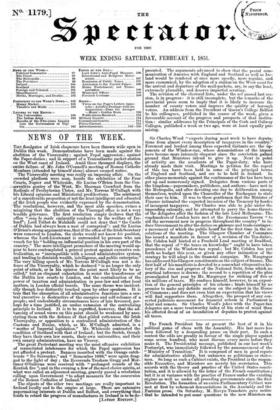NEWS OF THE WEEK.
T*E- floodgates of Irish eloquence have been thrown wide open in Dublin this week. Demonstrations have been made against the _ abolition Of the Viceroyalty; against Papal aggression ; against the Paper-duties ; and in support of a Transatlantic packet-station on the West coast of Ireland. Amid these thronged displays, the entire failurcL of. Mr: Sohn O'Connell's meeting of Roman Catholic Members (attended by himself alone) almost escaped notice. - The Viceroyalty meeting was really an imposing affair. On the ' crowded platform were . seen, beside the celebrities of the Four Courts, Napier and 'Whiteside, Sir Lucius-O'Brien from the Con- - servatiie gentry of the Weal, Mr: Sharman Crawford from the Itadieals of Presbyterian -Ulster, and Mr. Torrens M'Cullagh with his --Liberal opinions and Ministerial predilections. The sentiment
• of a considerable proportion of not the least intelligent and educated of the Irish people was evidently expressed by the demonstration.
j-The resolutions, however, and the most able speeches, evince a : misgiving that the abolition of the Viceregal office is not a very
• tenable grievance. The first rescdution simply declares that the
• office --"-nia-y-be thxide- einiieritly conducive to the welfare of Ire- land"; Lord Talbot de Malahide. could not deny- that "the Castle ,of Dublin had 'always been a nest of corruption": and Sir Lucius O'Brien's strong argumentwas, that if the office of the Irish Secretary . were removed to London, the clerks would not know his position, whereas the Lord-Lieutenant is surrounded by persons who can vouch for his "holding an-influential position in his own part of the country." The more intelligent promoters of the meeting wonld ap- pear to have contemplated a general protest against excessive cen- tralization, as "incompatible with a sound administrative system, anti tending to diminish wealth, intelligence, and public enterprise." The -very telling speech of Mr. Torrens avoilineh was not a de- fence of the Viceroyalty, which he declared "is no longer the only - point of attack; or in his opinion the point most likely to be as- sailed," but an eloquent exhortation to resist the transference of • the- Dublin law courts to London, and the centralization of the power of taxation and administration in poor-law and other local matters, in London official boards. The same theme Was incident- . ally though less distinctly touched upon by other speakers. It is true that the absorption of all administrative functions into a cen- tral executive is destructive of the energies and self-reliance of a . people ; and undoubtedly circumstances have of late favoured, per- ; haps for a time justified, an undue extension of the centralizing :principle to Ireland. It is to be regretted, however, that the ad- vancing of sound views on this point should be weakened by asso- ciating them with the defence of that gilded rottenness the Irish . Viceroyalty, or opposition to a centralized administration of the Customs and Excise, which, as Mr. M'OnlIngh admitted, is a "matter of Imperial legislation." Mr. Whiteside contrasted the condition of Scotland with that of Ireland ; but the Scotch, though they have their own law courts, their own universities, and their own county administration, have no Viceroy. The great Protestant meeting was the most offensive exhibition of resuscitated intolerance for which the Papal aggression has yet afforded a pretext. Banners inscribed with the Orange catch- words "No Surrender," and "Remember 1688," were again drag- ged to the light of day ; the Reverends Tresham Gregg and Mor- timer O'Sullivan were received with "prolonged rounds of the Kentish fire "; and in the evening a few of the most choice spirits, at what was called an adjourned meeting, gravely passed a resolution calling upon Government "to adopt measures for the conversion of the Roman Catholics of Ireland.'
The objects of the other two meetings are really important to • Ireland locally and to the empire at large. There are extensive papermaldng interests at Dublin and Belfast, and everything that tends to retard the progress of manufactures in Ireland is to be de- [LATEsr Enrriox.]
precated. The arguments advanced to show that the postal com- munication of America with England and Scotland as well as Ire- land would be rendered at once more speedy, more regular, and more economical, by the adoption of a station on the West coast for the arrival and departure of the mail-packets, are, to say the least, extremely plausible, and deserve impartial scrutiny.
The revision of the electoral lists, under the act passed last ses- sion, is in progress : it is still incomplete, but the remarks of the provincial press seem to imply that it is likely to increase the number of county voters and improve the quality of borough voters. An address from the President of Queen's College Belfast to his colleagues, published in the course of the week, gives a favourable account of the progress and prospects of that institu- tion': similar addresses by the Principals of the Cork and GidWay Colleges, published a week or two ago, were at least equally pro- mising.


























